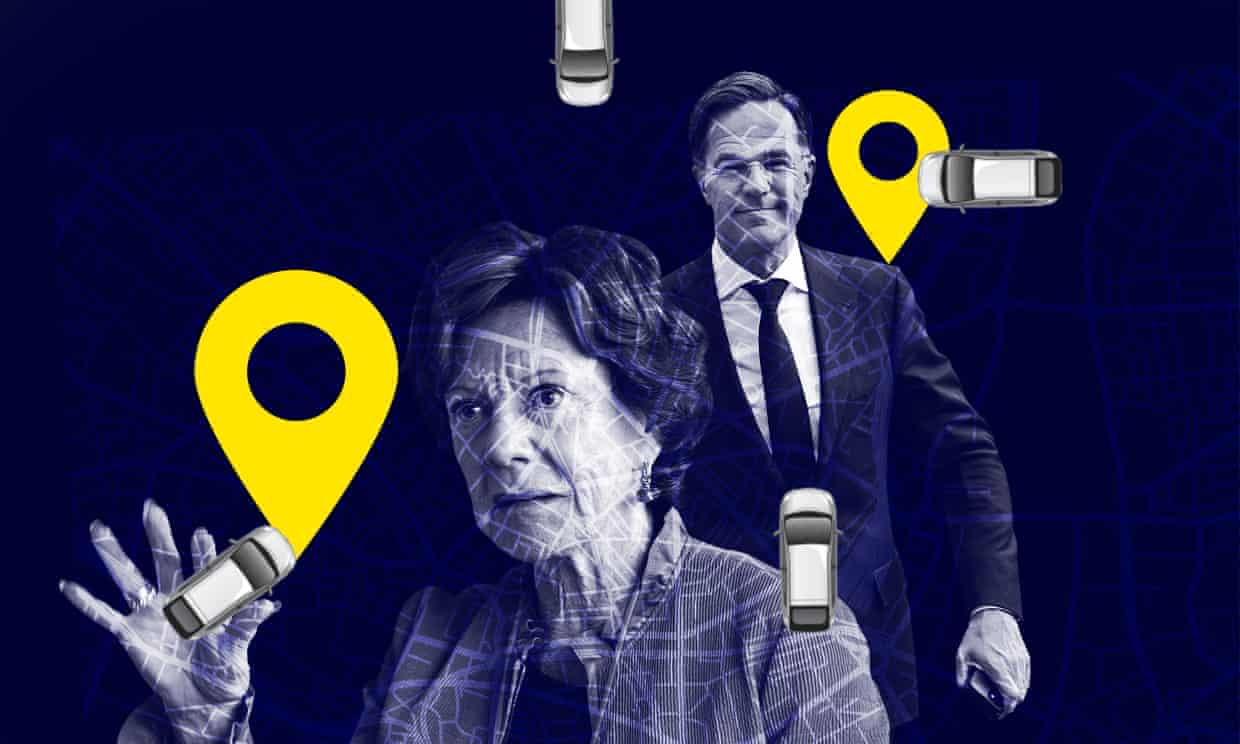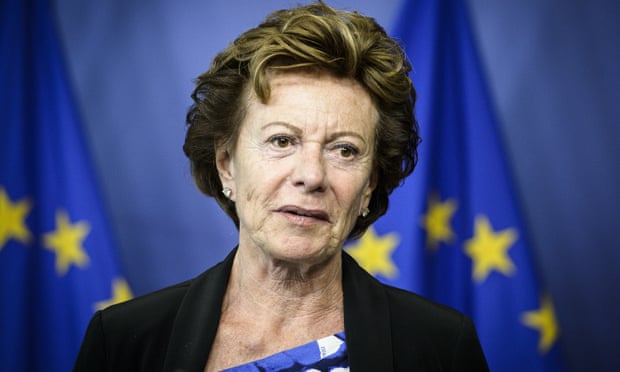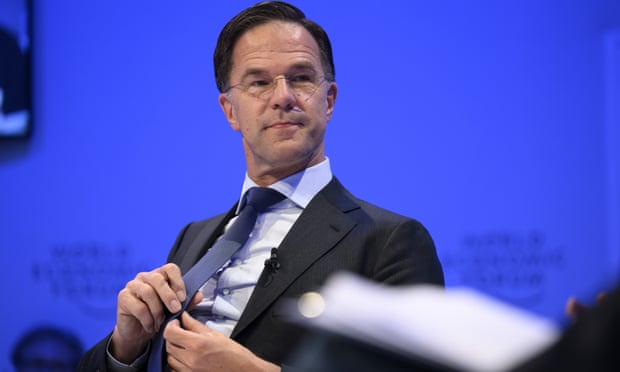Former EU digital chief Neelie Kroes secretly helped Uber lobby Dutch PM, leak suggests
THE GUARDIAN – Uber Files appear to show Neelie Kroes trying to assist firm during ‘cooling-off’ period after leaving commission
Files appear to show Neelie Kroes trying to assist firm during ‘cooling-off’ period after leaving commission

The European Commission is facing calls to launch an inquiry into its former vice-president Neelie Kroes, after leaked files suggested she secretly helped Uber lobby the Netherlands prime minister, Mark Rutte, and a string of other national Dutch politicians.
Uber considered its relationship with Kroes so sensitive that the company’s top European lobbyist repeatedly instructed colleagues to keep it hidden, warning in 2015 that it was “highly confidential and should not be discussed outside this group”.
Kroes says she did nothing wrong, adding that her role as a special envoy for tech companies meant it was her job to speak to politicians about nascent firms in the sector. But transparency experts said the covert help Kroes seemingly provided the cab-hailing app – which was under criminal investigation in the Netherlands at that time – may have breached EU ethics rules.
“This case should be urgently investigated so that lessons can be learned,” said Vicky Cann, at the Corporate Europe Observatory, a Brussels NGO that monitors lobbying.
Q&A
What are the Uber files?
The Uber files is a global investigation based on a trove of 124,000 documents that were leaked to the Guardian by Mark MacGann, Uber’s former chief lobbyist in Europe, the Middle East and Africa. The data consist of emails, iMessages and WhatsApp exchanges between the Silicon Valley giant’s most senior executives, as well as memos, presentations, notebooks, briefing papers and invoices.
The leaked records cover 40 countries and span 2013 to 2017, the period in which Uber was aggressively expanding across the world. They reveal how the company broke the law, duped police and regulators, exploited violence against drivers and secretly lobbied governments across the world.
To facilitate a global investigation in the public interest, the Guardian shared the data with 180 journalists in 29 countries via the International Consortium of Investigative Journalists (ICIJ). The investigation was managed and led by the Guardian with the ICIJ.
In a statement, Uber said: “We have not and will not make excuses for past behaviour that is clearly not in line with our present values. Instead, we ask the public to judge us by what we’ve done over the last five years and what we will do in the years to come.”
The details of Kroes secretly assisting the California tech group are contained within the Uber files, a hoard of 124,000 records leaked to the Guardian and shared with the International Consortium of Investigative Journalists and media partners in 30 countries.
The data appears to show Kroes, who had been the EU’s top official on internet policy, offering to arrange a series of meetings for Uber during her 18-month “cooling-off period” after leaving the commission.

The cooling-off period aims to reduce conflicts of interest by restricting the jobs commissioners can take once they have stepped down. In Kroes’s case it ran from November 2014 until May 2016, when it was announced she was joining Uber’s public policy advisory board. For this, she was paid $200,000 a year, the documents suggest.
Despite a commission ban on taking that role before May 2016, Kroes spoke to Dutch government ministers about Uber and offered to set up talks with senior EU officials, according to the leaked files.
And when Uber’s Amsterdam headquarters were raided by police in the spring of 2015, Kroes called Dutch government ministers to get regulators to “back off” as she “harassed” a top civil servant, internal Uber emails claim.
‘Mega-confidential’
Uber’s desire to have Kroes onboard was understandable. She was one of the EU’s most powerful policymakers, and a fan of the cab-hailing service.
As a serving commissioner in April 2014, Kroes put her name to a strident blogpost attacking a decision by a Brussels court to ban the app, describing the move as “crazy” and designed to protect “a taxi cartel”.
In email exchanges, Uber executives made clear they did not want her 10-year stint as European commissioner to end in October 2014 – with the company’s then top European lobbyist, Mark MacGann, writing in September of that year: “Frankly I can’t count on her successor to be of any help.”
But the leaked correspondence also shows how Uber was already planning a future that would include Kroes. “We are getting Neelie Kroes to join our advisory board (mega confi[dential]),” MacGann wrote to another Uber executive on 25 September 2014.
The plan would take some time to come to fruition and, separately, the Dutch politician took on a different role.
In January 2015, the Dutch government unveiled her as its special envoy for startup companies, after the commission granted special permission for Kroes to take up the ambassadorial post. She remained bound by standard commission commitments, however, such as acting with “integrity and discretion”.
While there may be a possible overlap with the startup role and companies such as Uber, it was clear at the time that Kroes’s new position should focus solely on broad themes. The commission said it approved her appointment as “the activity did not concern individual companies specifically, but consisted in promoting a public interest in the Netherlands with possible wider positive effects for Europe as a whole”.
Yet, during 2015 the politician appears to have played a central role in helping Uber in the Netherlands, with the relationship kept strictly on the downlow.
In March 2015, MacGann admonished a consultant who put Kroes’s name on a document: “That was an error (understatement),” he wrote. “Her name should never figure on a document whether internal or external. We have a specific relationship with Neelie Kroes right now, which is sensitive and highly confidential.”
Less than two weeks later, life at Uber was to get more sensitive still.
Raided
On 26 March 2015, Dutch police raided Uber’s Amsterdam office as part of an investigation into whether the company was breaking Netherlands taxi law by offering its UberPop service, which essentially allowed anybody with a driving licence to become a taxi driver for a few hours.
One hour and 34 minutes after the raid commenced, MacGann emailed other Uber executives, including the company’s co-founder Travis Kalanick, the leaked records show. He claimed to colleagues that Kroes was making calls at his request.
“Neelie Kroes calling minister of economy [Henk Kamp] now and other members of the government to force regulator and police to back off,” the email said. “We are being questioned now.”
MacGann also reported that Kroes had spoken to Melanie Schultz, the minister for infrastructure and environment.
There were more slightly breathless exchanges days later when Uber’s Amsterdam base was raided again, on 2 April 2015. This time, MacGann emailed Uber colleagues to tell them Kroes had contacted Schultz once more and “then harassed” the top civil servant at the ministry for infrastructure and environment, Siebe Riedstra.
“[Kroes] explained the problem of Uber and asked me who is responsible,” Riedstra told the Guardian when recalling that conversation this month, although he denied he had been harassed. “She was clear about being connected to Uber,” he added.
The documents continue to paint a picture of Kroes mucking in for the Californian company in the weeks following the raids. She was, MacGann promised colleagues on 22 April 2015, going “to explain [to Dutch officials] that we are willing to negotiate a settlement, to calm down enforcement and incentivise the transport ministry to get in a room with us”. It is unclear whether Kroes raised these issues in her contacts with Dutch ministers.
He also returned to a familiar theme. “Her reputation and our ability to negotiate solutions in the Netherlands and elsewhere would suffer from any casual banter, inside or outside the office,” he said.
‘I will do my utmost’
All of this was critical for Uber as, despite being a geographically small country, the Netherlands was a symbolically important territory in the company’s strategy. Like many US tech firms, it had located its international headquarters in Amsterdam, seemingly to pay lower taxes.
The company needed to be seen to be a success where its non-US operations were based, which elevated the significance of Kroes and her contacts – even the obviously elite ones.
Neelie Kroes helped Uber meet Rutte, a fellow member of the liberal People’s Party for Freedom and Democracy, the Uber files record.
Emails imply that the pair of Dutch politicians had a close working relationship, with MacGann writing to an Uber colleague in March 2015 to relay how Kroes was “passing some messages for me this weekend to the Dutch PM”.

Rutte seemed to offer some encouragement too. Notes taken at a subsequent meeting between the prime minister, Kalanick and Kroes in January 2016 suggest that Rutte told Kalanick: “I want you to grow.” The trio then appeared together in a publicity photograph.
Transparency experts say the assistance outlined in the Uber files suggest Kroes may have breached EU ethics rules, which state how commissioners must “behave with integrity and discretion” when accepting jobs and benefits after ceasing to hold office.
Alberto Alemanno, an EU law professor at HEC Paris business school, added that
Kroes’s support for Uber appeared to represent a breach of the authorisation she obtained to be Dutch special envoy for startups.
Meanwhile, the files suggest Neelie Kroes appeared ready to organise meetings with two European commissioners for Uber, raising questions about whether she complied with the spirit of EU rules that ban lobbying during the cooling-off period.
The 2011 code of conduct said former commissioners were forbidden from lobbying the executive branch of the EU during an 18-month period after they stood down. Yet, in May 2015, Kroes appears to have suggested she might facilitate a meeting for the company with the transport commissioner, Violeta Bulc. “Violeta is travelling like hell,” Kroes wrote to MacGann on 15 May 2015. “Let you know what is the new proposal.”
Days before the cooling-off period ended, Kroes also promised to set up a meeting between Kalanick and the European Commission first vice-president, Frans Timmermans, who is also Dutch. “I will do my utmost for Frans,” she wrote on 29 April 2016.
It is not clear whether the assistance Kroes appears to have offered Uber in relation to Dutch politicians, on the one hand, and European commissioners on the other, proved tremendously successful or materialised. Ultimately, after a four-year investigation into the company in the Netherlands, Uber settled the case in 2019 by paying a €2m fine to the Dutch authorities for breaching local laws by allowing its drivers to operate without a taxi licence.
Yet, there was a time when the cab-hailing app seemed to have valued the efforts the former commissioner made on its behalf.
She has been “very generous” with her time and advice, while also facilitating “a number of high-level meetings,” an internal Uber note in August 2015 recorded, which went on to mention how Kroes was then seeking commission approval to formally work for Uber before her cooling-off period expired.
Only, that approval never came.
The Juncker refusal
In November 2015, Uber and Kroes received an opinion from the commission’s “ad hoc ethical committee” stating she should not work for the tech company before her 18-month cooling-off period ended in May 2016.
Less than a month later, Kroes tried another approach, this time seeking permission from the then commission president, Jean-Claude Juncker, to take up the role. He rejected her request, too, in a manner that riled Kroes.
“Incredible, very unpolite [sic],” she wrote to MacGann, suggesting – without providing evidence – that the president must have been drunk when he drafted his reply.
Yet, despite the ban on her taking a formal Uber role, the leaked files suggest she continued to assist the company in the background.
And the company remained sensitive about the former commissioner’s reputation once she joined Uber in May 2016, the files suggest. In emails, Uber executives considered there to be a risk of Kroes becoming “the poster child for the discussions around ‘revolving door/tech’s crony capitalism’”.
Responding to questions, Kroes denied she had behaved inappropriately. She said she served in the unpaid role as special envoy for startups at StartupDelta in the Netherlands from January 2015 to June 2016. “I was required to interact with a wide array of business, government and non-governmental entities, with the aim to promote a business-friendly and welcoming ecosystem in the Netherlands.”
She added: “After my term as European commissioner and once my cooling-off period ended, in May 2016 I joined Uber as chair of its global policy advisory board. Consistent with my ethical duties as a former European commissioner, I did not have any formal nor informal role at Uber before that particular date of May 2016.”
MacGann also defended Kroes, saying he did not believe she had violated any rules or policies in her interactions with him. “She was Mark Rutte’s special envoy for Dutch startups, and Uber was a startup with its international HQ in the Netherlands.”
But a spokesperson at the Dutch ministry of economic affairs said Kroes’s remit as special envoy would not have entitled her to represent the interests of individual US tech companies based in the Netherlands to Dutch ministers. “Uber was not considered a startup in 2015,” the spokesperson said.
Meanwhile, some of the people named in the emails disputed the way the leaked correspondence characterised what had happened. Kamp, the former Dutch economy minister, denied suggestions Kroes attempted – or would have attempted – to get regulators to “back off” Uber.
A spokesperson for Melanie Maas Gesteranus (formerly Schultz) said she recalled there was contact, but “what, when and with whom she did not remember after seven years”, adding that such contact did not influence her actions.
Rutte’s office said the Dutch cabinet and prime minister had a role in attracting foreign investment and employment to the Netherlands, adding that it was not possible to answer detailed questions in the time available.
Juncker, who denied Kroes permission to work for Uber in 2015 and has since stood down as president, referred questions to the current commission.
“The reason [for refusing permission] was the digital dimension of the services provided by Uber and the link with Ms Kroes’ previous portfolio,” the commission said. “There is no new element which could put the conclusions drawn at the time into question.”
A spokesperson for Timmermans said neither he nor his top officials had any correspondence from Neelie Kroes about Uber. Kalanick and Uber’s Brussels office had contacted Timmermans, but no meeting took place, the spokesperson said.
Bulc said she did not recall being approached by Kroes about Uber, adding that all her meetings with the company followed standard commission procedures.
Uber said Kroes left its advisory board in 2018, adding: “Since this period, we have implemented new guidelines for our teams in Europe, which govern lobbying and external engagements with policymakers, strengthening our requirements and oversight of those activities.”
More on the contribution of Alberto Alemanno and The Good Lobby to the Uber Files here.